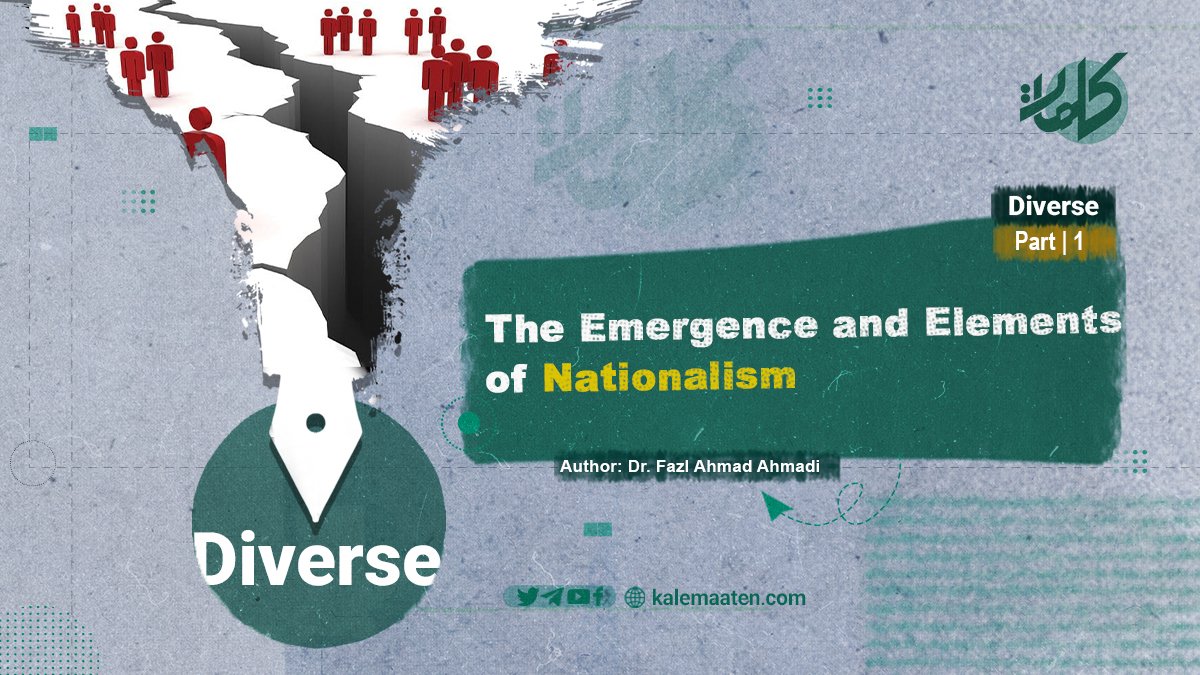
Author: Dr. Fazal Ahmad Ahmadi
The Emergence and Elements of Nationalism (Part One)
Abstract:
One of the dominant and regulating ideas of political relations between people and rulers in recent centuries is nationalism. This idea, which primarily refers to belonging to a particular nation, race, language, identity, and ethnicity, has sometimes been used negatively and has had adverse results for various groups and classes. Considering this issue, the main topic of this article is to explore how nationalism functions as a philosophical/political belief and to identify its genesis factors and constituent elements.
Using library resources and the descriptive-analytical method, we conclude that nationalism is fundamentally based on a foundation of general culture and political symbols, ultimately evolving into a collective political culture. This idea aims to unite citizens to love their nationality, observe the laws, and defend their homeland. Its genesis factors and constituent elements are diverse and have changed in accordance with the needs of this belief throughout history.
Keywords: Nationalism, Nationality, Political, Group, Thought.
Introduction
Many of the political ideas currently discussed and studied in scientific literature have Western origins. One such dominant idea that has regulated political relations between people and rulers in recent centuries is nationalism. This concept primarily evokes nationalism and belonging to a particular nation, race, language, identity, and ethnicity; however, it has sometimes been misused and has had detrimental effects on different groups and classes.
Research in the field of political ideas, particularly regarding nationalism, has attracted many followers and retains special significance even in the 21st century, a time characterized by the concentration of power among the elite. Nationalism is a crucial issue that contributes to the political, economic, and cultural development of human society. A mutual understanding of various political differences and beliefs, originating from the will of its founders, has dominated the fundamental issues of human society.
From this perspective, understanding the political thought of nationalism is crucial, as paying attention to it can foster the growth and development of beliefs while also promoting respect for the beliefs of others. This inquiry brings us closer to the realization that many people still subscribe to political ideas that may be rejected from our viewpoint, particularly from the standpoint of Islamic law.
In political thought, numerous authors have penned books covering various topics, including nationalism. It can be stated that discussions about nationalism are present in nearly every book focused on political thought in general. Additionally, many articles have been written on the philosophical/political thought of nationalism; some of these are listed in the references of this study.
The distinction of this study from others in the field lies in its general and concise examination of the beliefs, ideas, factors of emergence, and elements of the doctrine of nationalism. This examination enables the reader to understand nationalism holistically and grasp the beliefs underpinning this political thought, as well as how it has grown and developed in interaction with other ideologies. It also addresses the challenges and successes encountered throughout its historical trajectory.
In light of this issue, the primary question of the present research is: how does nationalism function as a philosophical/political belief and thought, and what are its factors of emergence and constituent elements?
Using library resources and a descriptive-analytical method, we conclude that the core of nationalism is based on general culture and political symbols, which ultimately coalesce into a collective political culture that seeks to unite citizens in their love for their nationality, adherence to the laws, and defense of their homeland. The factors of its emergence and constituent elements are diverse and vary according to the evolving needs of nationalism throughout history.
Continues…


